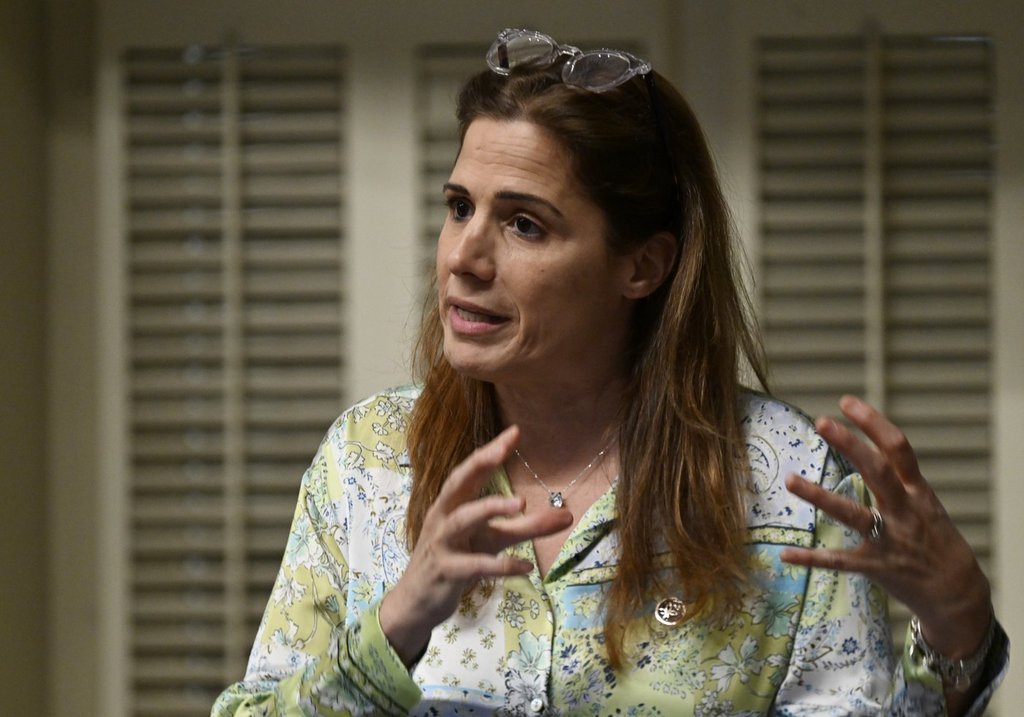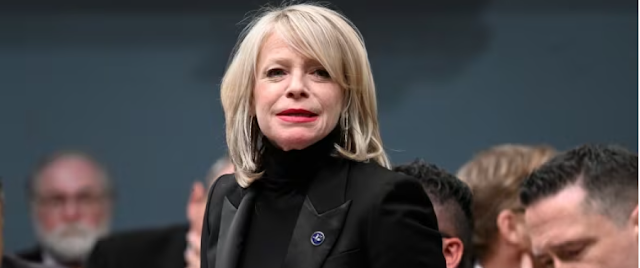..
How Quebec is getting a freedom-of-speech lesson from
a controversial Christian group
Experts say province cancelling religious event points to fragility of fundamental right
Holly Cabrera · CBC News ·
Posted: Jun 13, 2023 1:00 AM PDT |
Quebec Tourism Minister Caroline Proulx said events that run counter to the government's 'fundamental principles' can't be held at government-run convention centres. (Jacques Boissinot/The Canadian Press)
An evangelical group is preparing to take the Quebec government to court for allegedly breaching its fundamental rights, after the province abruptly terminated a contract to host an event in a public space.
While some initially applauded the Coalition Avenir Québec (CAQ) government's show of support for women's right to choose at a time when abortion rights in the U.S. have been jeopardized, constitutional experts are saying the move casts doubt on the health of freedom of expression in Quebec.
Quebec Tourism Minister Caroline Proulx cancelled the gathering by Kelowna, B.C.,-based Harvest Ministries International (HMI) — less than a month before it was to take place — because she said the event was anti-abortion, which goes against "the fundamental principles" of the province. The contract dated back to February.
But HMI maintains that no anti-abortion content was part of the rally's program.
The rally was supposed to take place at the Quebec City Convention Centre from June 23 to July 2. (Olivia Laperrière-Roy/Radio-Canada)
Samuel Bachand, a lawyer representing HMI, said, to his knowledge, the group has been unable to find another venue in the city to host the "Faith Fire Freedom" rally scheduled for June 23.
The gathering was advertised as part of the group's "Battle for Canada" prayer-and-revival movement, which seeks to have conservative Christians take over the Canadian political system and provides a platform for transphobic messaging.
HMI has had its fair share of controversies.
Quebec government won't reinstate event by controversial Christian group
The group openly holds anti-abortion views, with its leader, Art Lucier, in online videos repeatedly condemning Bill C-150 — a law passed in 1969 that decriminalized homosexuality and abortion in Canada.
In the past couple of years, the HMI church has been fined thousands of dollars for disregarding public health orders during the COVID-19 pandemic.
Bachand said the group will be filing a civil lawsuit by the end of June, claiming compensatory and punitive damages, constitutional declarations and other remedies.
He says the government is breaching Sections 3, 10 and 15 of Quebec's Charter of Human Rights and Freedoms, which relate to freedom of expression, discrimination and access to public space.
Art Lucier, right, pictured here with his wife, Heather, is the leader of Harvest Ministries International, based in Kelowna, B.C. (Submitted by Harvest Ministries International)
HMI issued a formal notice on June 5 to Proulx and the director of the Quebec City convention centre, saying it estimates the cancellation cost it $450,000 in material losses.
All three opposition parties initially backed the government's call, but within a week, the Parti Québécois and Québec Solidaire had reconsidered their position.
And in no shortage of irony, the Liberal Party of Quebec — a party whose name bears the word "liberal" — doubled down against exercising freedom of expression. Interim leader Marc Tanguay said the government used an "exceptional measure" to keep out a group that describes abortion as "murder."
But the CAQ and the Liberals' reasoning poses a risk to fundamental rights, which the public should pay more attention to, says Université de Montréal constitutional law professor Stéphane Beaulac.
As HMI points out in its formal notice, even if organizers had intended for the gathering to be an anti-abortion event, the government pulling the plug on the meeting is questionable at best and a Charter violation at worst.
State 'censorship' doesn't end here, experts warn
Robert Leckey, the dean of McGill University's faculty of law and a fervent advocate for LGBTQ rights, called the government's decision to cancel the gathering "very problematic."
"Nobody bats an eyelid about freedom of expression when it's used by people expressing congenial views," Leckey said. "It only matters when it's views that are controversial."
Robert Leckey, the dean of the McGill Faculty of Law, says Quebec opposition parties' initial support of the government's move isn't surprising given the concern for women's rights after the U.S. Supreme Court overturned Roe v. Wade just a year ago.
(Submitted by Robert Leckey)
Drawing a parallel between the event cancellation and Education Minister Bernard Drainville banning prayer spaces in public schools in April in the name of religious neutrality of the State, Leckey said the ministers "seem to think that they have a very immediate role to play when they see something they don't like going on."
He added "there's no reason to think" governmental interference would be limited to this one case involving an evangelical church group.
Not mincing words, Beaulac called the broken contract an example of censorship.
The CAQ government "punishing a group" because it disagrees with it on issues like abortion is essentially a "blatant case of abuse of public power that is intertwined with fundamental freedoms," he added.
What is especially troubling, Beaulac says, is the government citing a conflict with its own "fundamental principles" to explain why the convention centre would no longer host the event.
Fundamental rights are protections for people — not abstractions like the State, he said.
Stéphane Beaulac, a constitutional law professor at Université de Montréal, says the government cancelling the event reflects a 'blatant case of abuse of public power.' (Submitted by Stéphane Beaulac)
"The issue is not about abortion," he said. "It's about the expression of those opinions, and it's about the possibility of holding an assembly."
"It's not for the government to decide what you think."
Burden of proof is on government
The notice goes as far as saying the cancellation echoes the infamous Roncarelli v. Duplessis Supreme Court case.
The 1959 landmark case saw Quebec premier Maurice Duplessis illegally revoke the liquor licence of a Montreal restaurant owner who was a Jehovah's Witness at a time when Quebec was resolutely Roman Catholic.
Meet the man who took on Quebec premier Maurice Duplessis and won in the Supreme Court of Canada.
Aired May 25, 1965 on CBC's Front Page Challenge.
Quebec's Human Rights and Youth Rights Commission said last Friday the government's actions raised "fundamental questions relative to the protection of rights guaranteed by the Quebec Charter of Rights and Freedoms."
Since no right is absolute, rights must always be reconciled with others, which sets the bar to prevent freedom of expression in a liberal democracy pretty high, Beaulac says.
For instance, hate speech is not protected by freedom of expression rights.
A clear threat of imminent violence or an attempt to overthrow a democratic government are two other obvious limits to freedoms that come to mind, he says.
But the tourism minister didn't cite those reasons: the government ultimately cancelled the event because of a difference of opinion.
Quebec's Charter of Rights and Freedoms, partly inspired by the International Covenant on Civil and Political Rights, became law in 1975.
Given the rights laid out in it — and in the Canadian Charter of Rights and Freedoms — HMI's lawyer says there is no need for the government to impose its own fundamental principles.
"If they are not happy with the Constitution, they can always try to have it amended... unless they come up with another one of those notwithstanding clauses which they seem to be very fond of," Bachand said in a statement, alluding to the CAQ government's pre-emptive use of Section 33 to pass Bill 21, the secularism law, and Bill 96, a more stringent language law.
Beaulac says the onus is on the Quebec government to prove there is a high enough risk of public unrest or the possibility of subverting the State to justify cancelling a gathering in a public space.
So far, the reason Quebec put forth is "no way near" the mark, he said.
A spokesperson for the tourism minister declined to comment on the case.
























